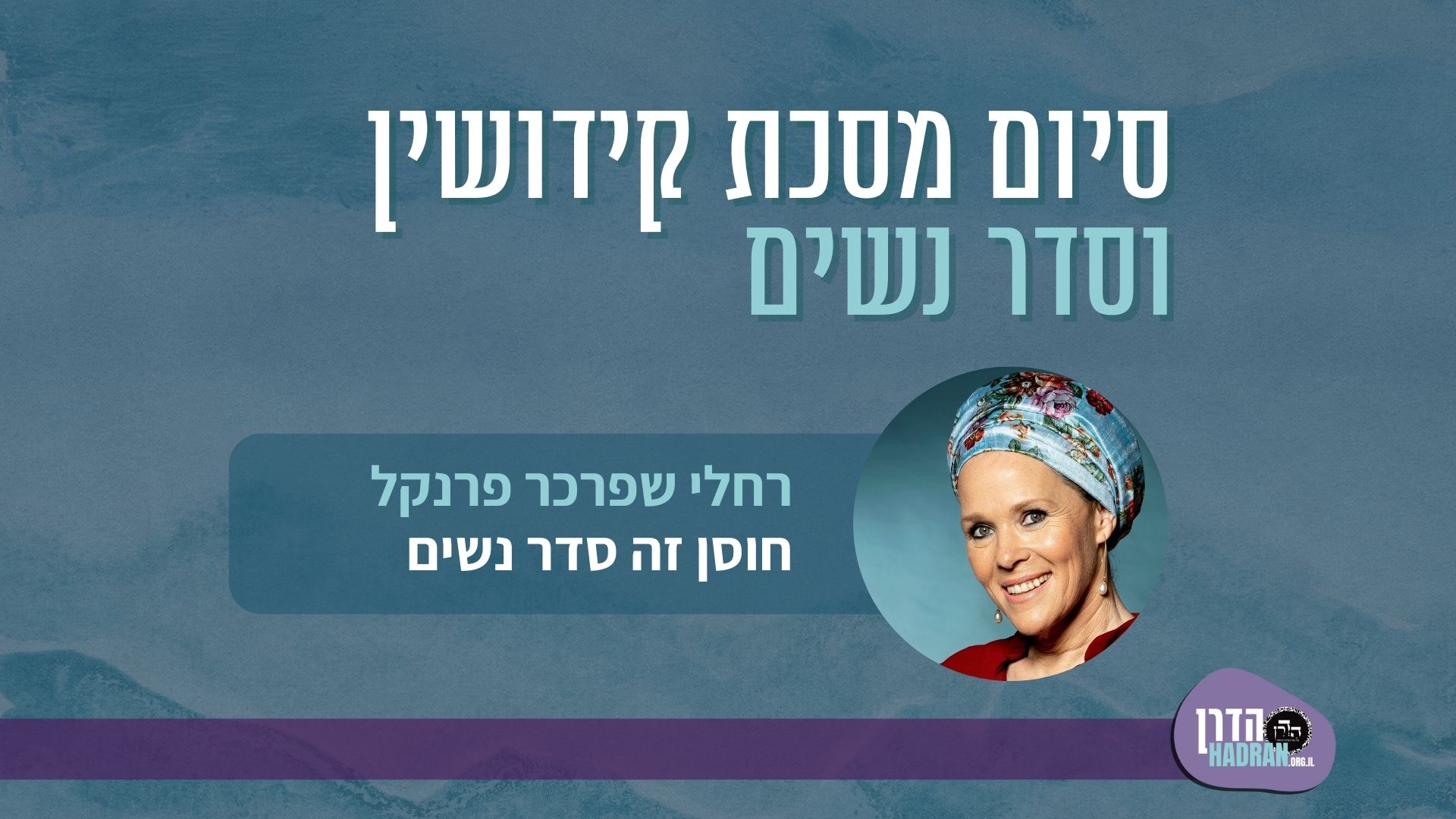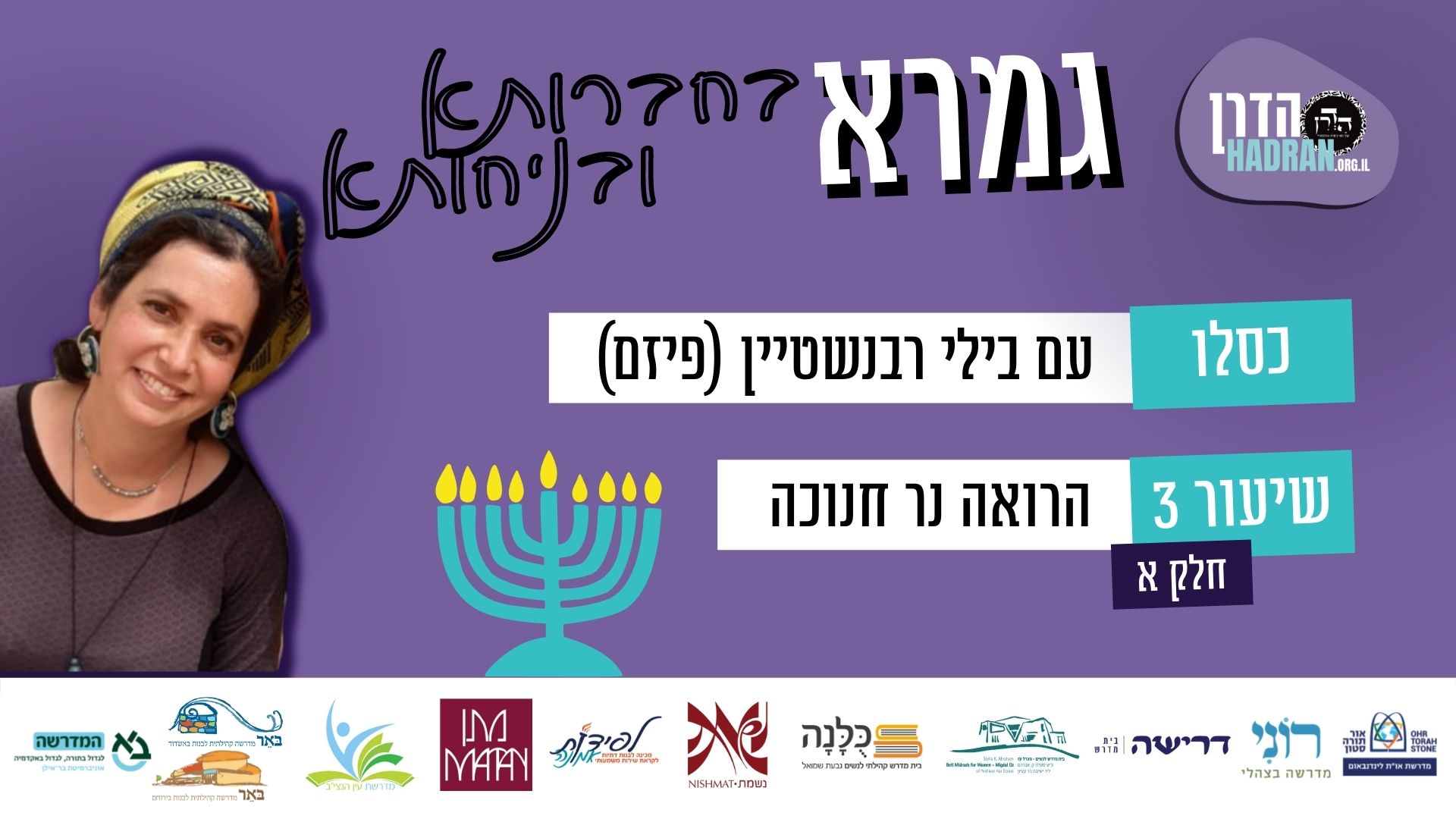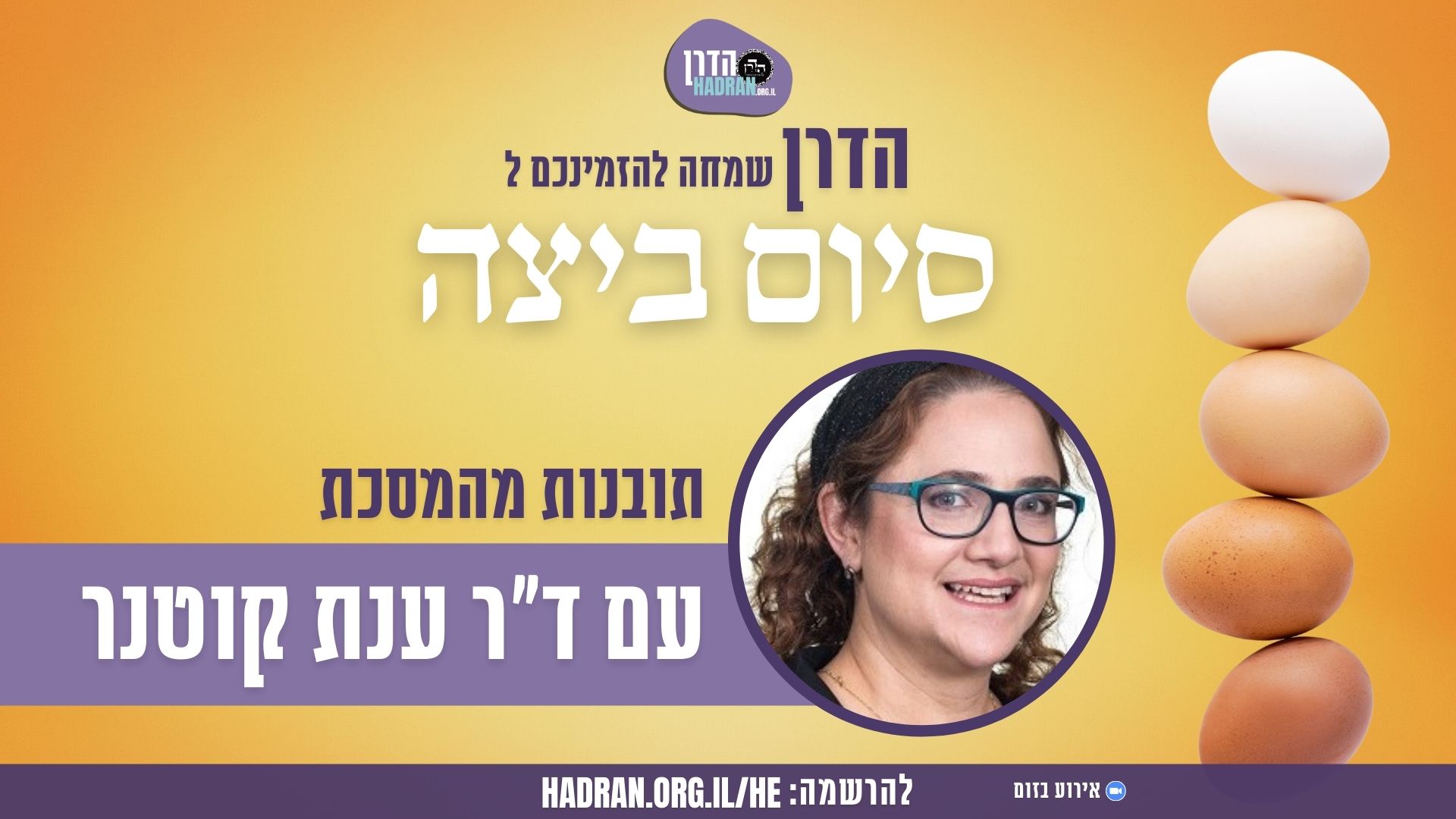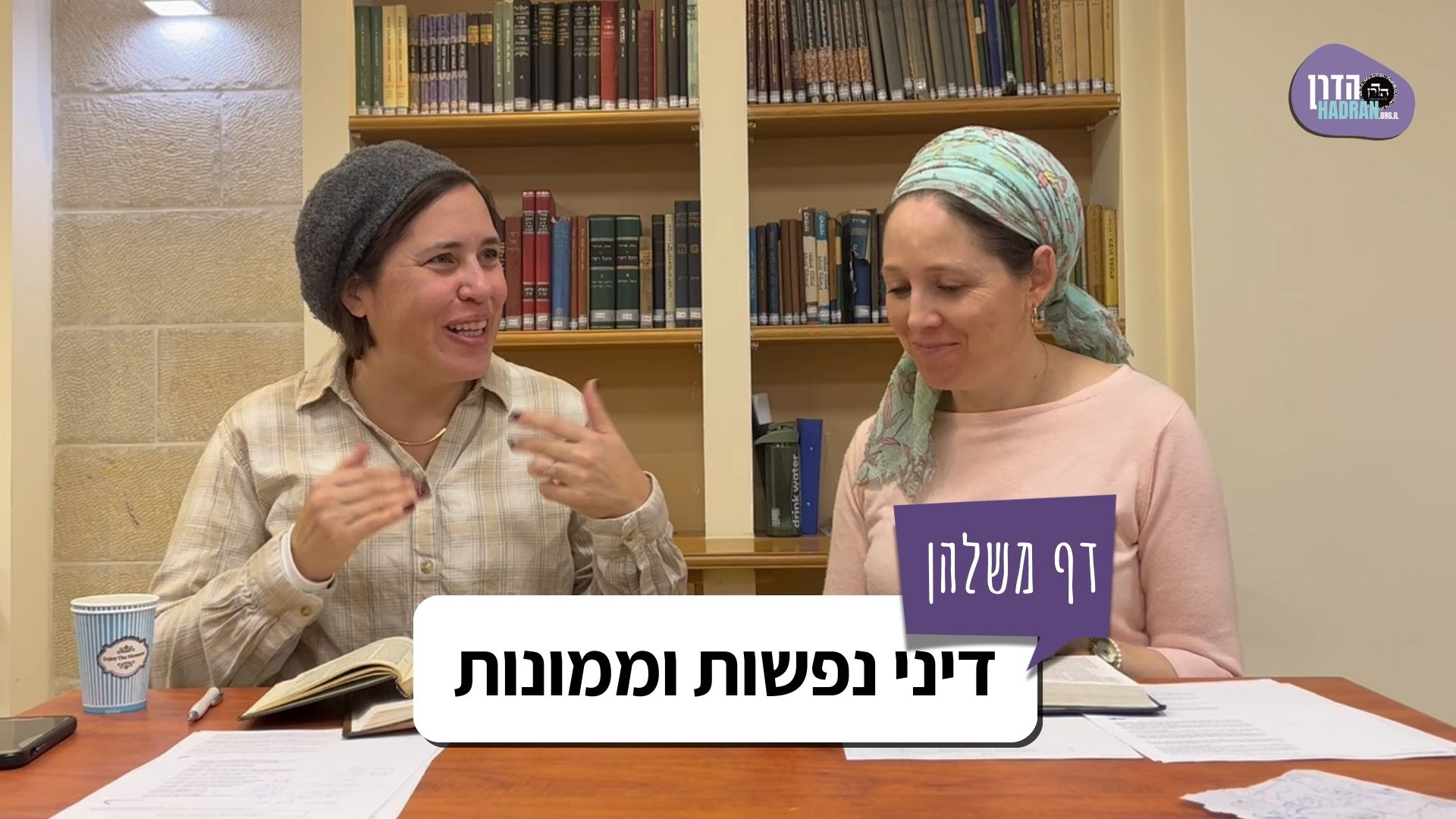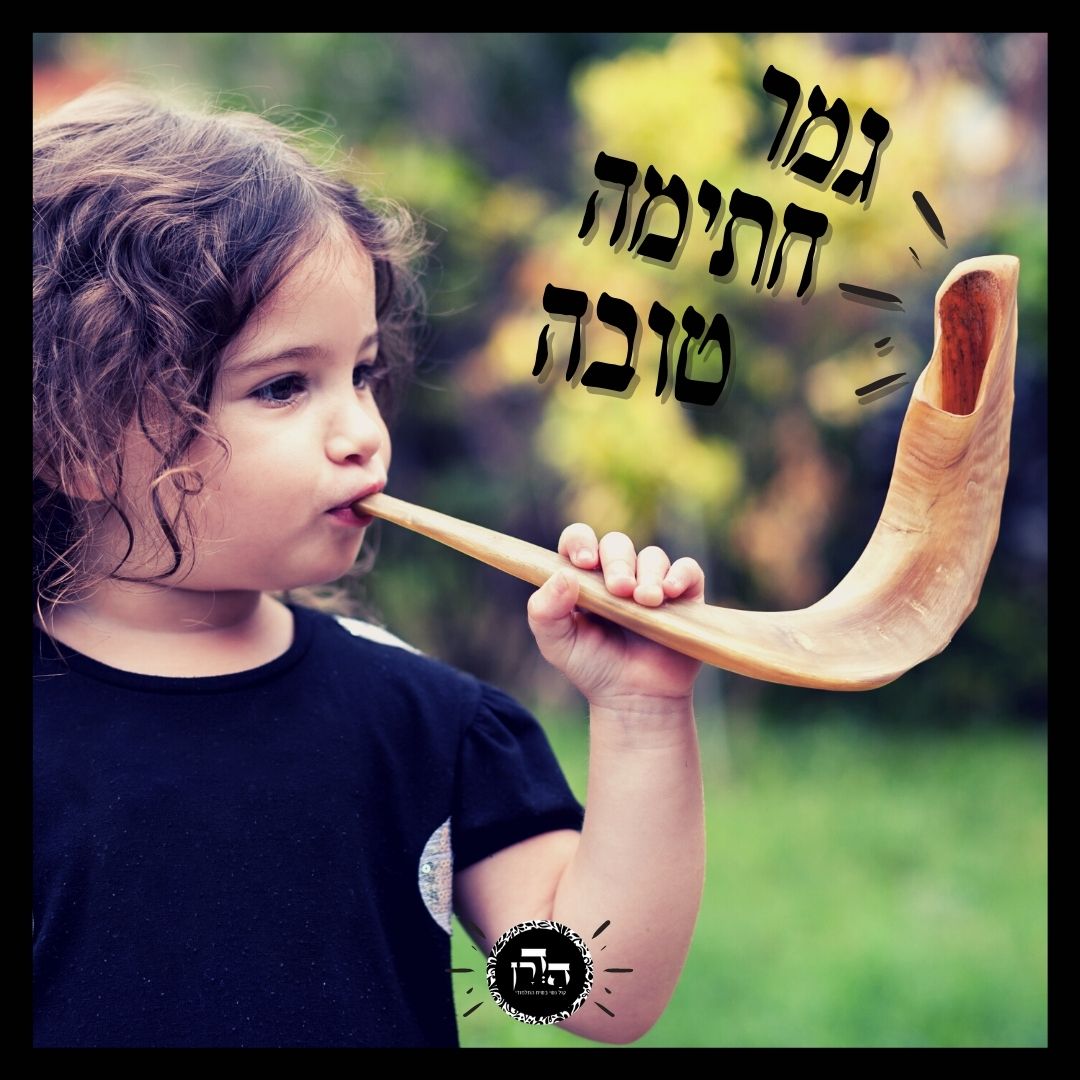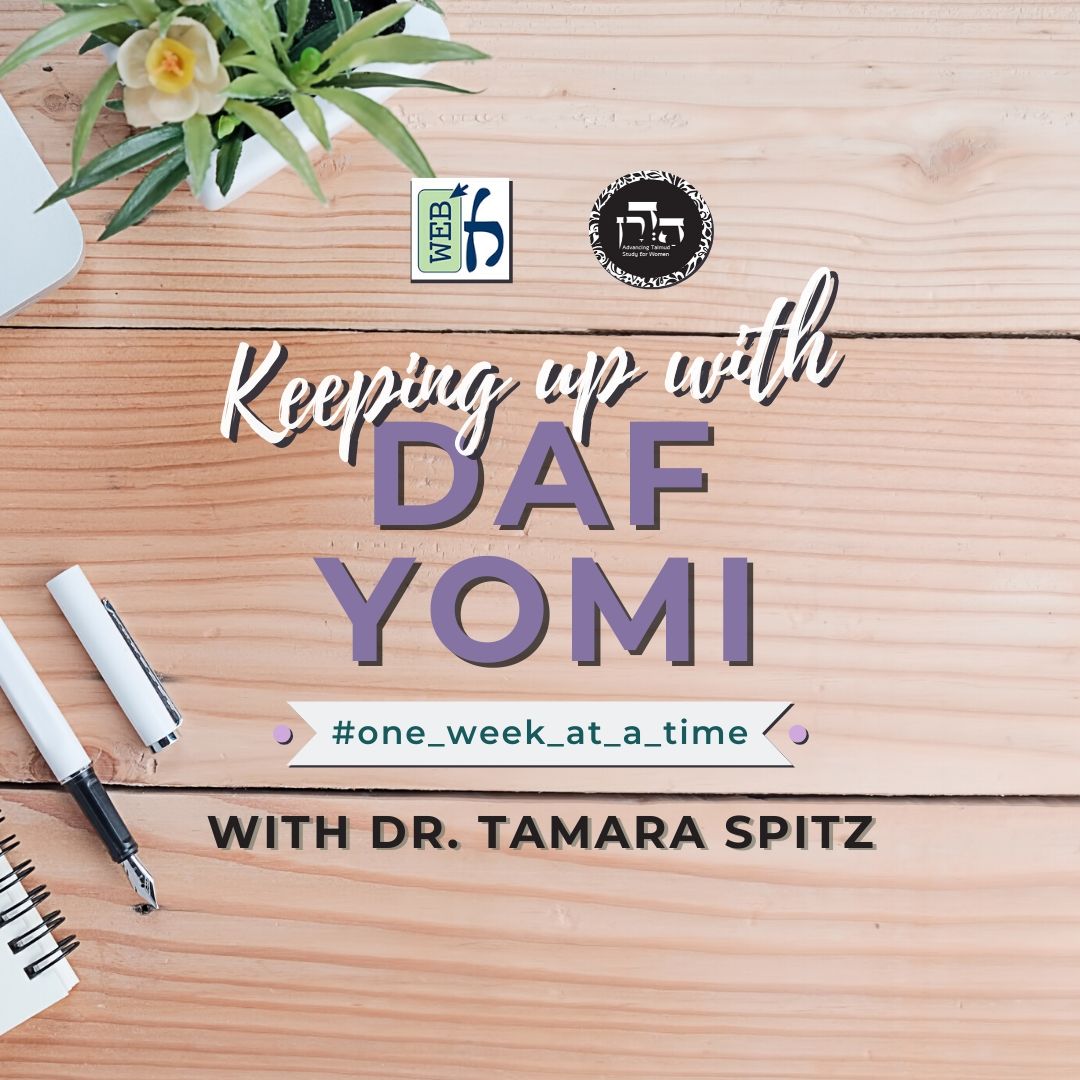מה הסטטוס של אשה שדיממה ביום י”א של זבה. עד כמה היא דומה לאשה ששומרת יום כנגד יום ביום בי”ב? מהי מחלוקת בית שמאי ובית הלל? לאחר טבילתה ביום י”ב, אם שימשה או התעסקה בטהרות, מה המצב? האם זה תלוי אם היא מדממת או לא בהמשך אותו היום? אם אשה ראתה ביום העשירי, האם היא שומרת יום כנגד יום – כי אין אפשרות להגיד לזבה גדולה. מחלוקת ר’ יוחנן וריש לקיש.
רוצה להקדיש שיעור?
כלים
העמקה
רוצה להבין מה באמת קורה מתחת לפני השטח של הסוגיה?
שיעורים, פודקאסטים והרחבות של מיטב המורות שלנו יפתחו לך עוד זוויות וכיווני חשיבה.
חדשה בלימוד הגמרא?
זה הדף הראשון שלך? איזו התרגשות עצומה! יש לנו בדיוק את התכנים והכלים שיעזרו לך לעשות את הצעדים הראשונים ללמידה בקצב וברמה שלך, כך תוכלי להרגיש בנוח גם בתוך הסוגיות המורכבות ומאתגרות.
פסיפס הלומדות שלנו
גלי את קהילת הלומדות שלנו, מגוון נשים, רקעים וסיפורים. כולן חלק מתנועה ומסע מרגש ועוצמתי.
נדה עב
וּבֵית הִלֵּל אוֹמְרִים: פְּטוּרִים מִן הַקׇּרְבָּן.
And Beit Hillel say: Although they transmit impurity to items designated for lying or sitting, they are exempt from bringing the sin offering. Since the twelfth day is unfit for the flow of a zava, and even if she were to experience bleeding on the eleventh, twelfth, and thirteenth days she would not become a greater zava, one who experiences bleeding on the eleventh does not need to observe a corresponding clean day.
טָבְלָה בַּיּוֹם שֶׁלְּאַחֲרָיו, וְשִׁמְּשָׁה אֶת בֵּיתָהּ, וְאַחַר כָּךְ רָאֲתָה — בֵּית שַׁמַּאי אוֹמְרִים: מְטַמְּאִין מִשְׁכָּב וּמוֹשָׁב, וּפְטוּרִין מִן הַקׇּרְבָּן.
If the woman immersed on the day following the eleventh day and she engaged in intercourse with the man of her house, i.e., her husband, on that twelfth day and then saw blood, Beit Shammai say: They transmit impurity to items designated for lying or sitting by rabbinic law, as the Sages issued a decree of impurity in the case when the second day is the twelfth day, due to a case when the second day is within the eleven days fit for the flow of a zava. And they are exempt from bringing the sin offering, as she observed part of the twelfth day, and the bleeding she experienced after engaging in intercourse, which occurred during her period of menstruation, is not fit to be appended to the discharge of the zava on the eleventh day.
וּבֵית הִלֵּל אוֹמְרִים: הֲרֵי זֶה גַּרְגְּרָן, וּמוֹדִים בְּרוֹאָה בְּתוֹךְ אַחַד עָשָׂר יוֹם, וְטָבְלָה לָעֶרֶב וְשִׁמְּשָׁה — שֶׁמְּטַמְּאִין מִשְׁכָּב וּמוֹשָׁב, וְחַיָּיבִין בְּקׇרְבָּן.
And Beit Hillel say: That husband is a glutton, as he could not wait for the conclusion of the twelfth day before engaging in intercourse. Nevertheless, the Sages did not issue a decree of impurity. And Beit Hillel concede to Beit Shammai in a case where the woman sees blood in the midst of the eleven-day period, and she immersed in the evening and engaged in intercourse with her husband without observing a corresponding clean day, that they transmit impurity to items designated for lying or sitting. And each of them is liable to bring a sin offering for participating in intercourse involving a zava.
טָבְלָה בַּיּוֹם שֶׁלְּאַחֲרָיו, וְשִׁמְּשָׁה — הֲרֵי זֶה תַּרְבּוּת רָעָה, וּמַגָּעָן וּבְעִילָתָן תְּלוּיִין.
If she saw blood in the midst of the eleven days and observed part of a corresponding clean day and immersed on the day following the day that she saw blood and engaged in intercourse with her husband, that is wayward conduct, as the possibility exists that she will experience bleeding after intercourse that will be appended to the bleeding of the previous day, rendering her a zava and disqualifying the immersion. And the status of ritually impure items with which they came into contact and the status of their intercourse is contingent upon whether she experiences bleeding on the day of her immersion, in which case the ritually pure items become impure and they are liable to bring a sin offering, or whether she does not experience bleeding that day, in which case the ritually pure items remain pure and the woman and man are exempt from bringing a sin offering.
גְּמָ’ תָּנוּ רַבָּנַן: וְשָׁוִין בִּטְבִילַת לַיְלָה לְזָבָה — שֶׁאֵינָהּ טְבִילָה, וְשָׁוִין בְּרוֹאָה בְּתוֹךְ אַחַד עָשָׂר יוֹם וְטָבְלָה לָעֶרֶב וְשִׁמְּשָׁה — שֶׁמְּטַמְּאָה מִשְׁכָּב וּמוֹשָׁב, וְחַיָּיבִין בְּקׇרְבָּן.
GEMARA: The Sages taught in a baraita: And Beit Shammai and Beit Hillel agree with regard to a woman who immersed at night to purify herself after having been a lesser zava, that it is not a valid immersion. And Beit Shammai and Beit Hillel also agree with regard to a woman who sees blood in the midst of her eleven days of ziva, rendering her a lesser zava who must wait one clean day and immerse the day after, but she immersed in the first evening without waiting one clean day and engaged in intercourse with her husband, that she transmits impurity to items designated for lying or sitting that came in contact with the couple, and she and her husband are liable to bring a sin offering.
לֹא נֶחְלְקוּ אֶלָּא בְּיוֹם אַחַד עָשָׂר יוֹם, שֶׁבֵּית שַׁמַּאי אוֹמְרִים: מְטַמְּאִין מִשְׁכָּב וּמוֹשָׁב וְחַיָּיבִין בְּקׇרְבָּן, וּבֵית הִלֵּל פּוֹטְרִין מִקׇּרְבָּן.
They disagree only in the case of a woman who sees blood on the eleventh day of her days of ziva, and immersed that evening, and engaged in intercourse with her husband. As Beit Shammai say: They transmit impurity to items designated for lying or sitting and are liable to bring a sin offering, and Beit Hillel deem them exempt from bringing a sin offering.
אָמְרוּ לָהֶן בֵּית שַׁמַּאי לְבֵית הִלֵּל: מַאי שְׁנָא יוֹם אַחַד עָשָׂר מִיּוֹם תּוֹךְ אַחַד עָשָׂר? אִם שָׁיוָה לוֹ לַטּוּמְאָה, לֹא יִשְׁוֶה לוֹ לַקׇּרְבָּן?
The baraita continues: Beit Shammai said to Beit Hillel: What the difference between the eleventh day itself and another day in the midst of the eleven days of ziva? If you equate the eleventh day to the other days with regard to ritual impurity, will you not equate it with regard to liability to bring an offering?
אָמְרוּ לָהֶן בֵּית הִלֵּל לְבֵית שַׁמַּאי: לֹא, אִם אָמַרְתָּ בְּתוֹךְ אַחַד עָשָׂר יוֹם, שֶׁכֵּן יוֹם שֶׁלְּאַחֲרָיו מִצְטָרֵף עִמּוֹ לְזִיבָה, תֹּאמְרוּ בְּיוֹם אַחַד עָשָׂר, שֶׁאֵין יוֹם שֶׁלְּאַחֲרָיו מִצְטָרֵף עִמּוֹ לְזִיבָה?!
Beit Hillel said to Beit Shammai: No, if you say that she is liable to bring an offering if she experiences bleeding in the midst of the eleven days, that is because the following day combines with it as a day of ziva. Will you say the same with regard to the eleventh day, when the following day does not combine with it as a day of ziva?
אָמְרוּ לָהֶם בֵּית שַׁמַּאי: הַשְׁווּ מִדּוֹתֵיכֶם! אִם שָׁיוָה לוֹ לַטּוּמְאָה — יִשְׁוֶה לוֹ לַקׇּרְבָּן, וְאִם לֹא שָׁיוָה לוֹ לַקׇּרְבָּן — לֹא יִשְׁוֶה לוֹ לַטּוּמְאָה.
Beit Shammai said to Beit Hillel: Apply your method equally. If you equate the two cases, bleeding on the eleventh day and bleeding on one of the other days of ziva, with regard to ritual impurity, equate them also with regard to liability to bring an offering. And if you do not equate them with regard to liability to bring an offering, do not equate them with regard to ritual impurity either.
אָמְרוּ לָהֶם בֵּית הִלֵּל: אִם הֲבֵיאנוּהוּ לִידֵי טוּמְאָה לְהַחֲמִיר, לֹא נְבִיאֵהוּ לִידֵי קׇרְבָּן לְהָקֵל.
Beit Hillel said to Beit Shammai: Even if we have brought a woman who experiences bleeding on the eleventh day and the man who engages in intercourse with her to ritual impurity, due to a decree to be stringent, so that people should not confuse one who experiences bleeding on the eleventh day with one who experiences bleeding during the other days with regard to ritual impurity, we will not bring them to the liability of bringing an offering, to be lenient. It would be a leniency to permit them to bring an unnecessary and therefore a non-sacred animal into the Temple courtyard.
וְעוֹד מִדִּבְרֵיכֶם אַתֶּם נוֹשְׁכִין, שֶׁאַתֶּם אוֹמְרִין: טָבְלָה יוֹם שֶׁלְּאַחֲרָיו, וְשִׁמְּשָׁה, וְאַחַר כָּךְ רָאֲתָה — מְטַמֵּא מִשְׁכָּב וּמוֹשָׁב, וּפְטוּרָה מִן הַקׇּרְבָּן. אַף אַתֶּם הַשְׁווּ מִדּוֹתֵיכֶם: אִם שָׁיוָה לוֹ לַטּוּמְאָה, יִשְׁוֶה לוֹ לַקׇּרְבָּן.
And furthermore, from your own statement you are refuted, as you say that if she immersed on the following day and engaged in intercourse, and afterward she saw blood, she transmits impurity to items designated for lying or sitting, but she is exempt from bringing the offering. You too should apply your method equally. If you equate a zava who immersed on the twelfth day with one who immersed on the night after the eleventh day with regard to ritual impurity, equate these cases also with regard to liability to bring an offering.
וְאִם לֹא שָׁיוָה לוֹ לְקׇרְבָּן, לֹא יִשְׁוֶה לוֹ לַטּוּמְאָה! אֶלָּא לְהַחְמִיר וְלֹא לְהָקֵל; הָכָא נָמֵי — לְהַחְמִיר וְלֹא לְהָקֵל.
And if you do not equate them with regard to liability to bring an offering, do not equate them with regard to ritual impurity either. Beit Hillel continued: Rather, you agree with us that the two are equated to be stringent, but not to be lenient. We say that here too, the two should be equated to be stringent but not to be lenient.
אָמַר רַב הוּנָא: מִשְׁכָּבָהּ וּמוֹשָׁבָהּ שֶׁבַּשֵּׁנִי, בֵּית שַׁמַּאי מְטַמְּאִין, אַף עַל פִּי שֶׁטָּבְלָה, אַף עַל פִּי שֶׁלֹּא רָאֲתָה. מַאי טַעְמָא? כֵּיוָן דְּאִילּוּ חָזְיָא מְטַמְּאָה, הַשְׁתָּא נָמֵי מְטַמְּיָא.
§ Rav Huna says, in further clarification of Beit Shammai’s opinion: If a woman experiences bleeding during the eleven days of ziva and must observe one clean day, but did not wait until the conclusion of that second day before immersing, with regard to her items designated for lying or sitting, on the second day, Beit Shammai render them impure by rabbinic law. This is the halakha even though she has immersed in a ritual bath and even though she did not see any blood after her immersion. What is the reason? Since if she would see blood she would render these surfaces ritually impure by Torah law, now too she renders them ritually impure by rabbinic law.
אָמַר רַב יוֹסֵף: מַאי קָא מַשְׁמַע לַן? תְּנֵינָא: טָבְלָה יוֹם שֶׁלְּאַחֲרָיו, וְשִׁמְּשָׁה אֶת בֵּיתָהּ, וְאַחַר כָּךְ רָאֲתָה — בֵּית שַׁמַּאי אוֹמְרִים: מְטַמְּאָה מִשְׁכָּבוֹת וּמוֹשָׁבוֹת, וּפְטוּרָה מִן הַקׇּרְבָּן!
Rav Yosef said: What is Rav Huna teaching us? We already learn in the mishna: If the woman immersed on the day following the eleventh day and she engaged in intercourse with the man of her house on that twelfth day and then saw blood, Beit Shammai say: They transmit impurity to items designated for lying or sitting by rabbinic law. And they are exempt from bringing the sin offering. Her impurity applies by rabbinic law, lest this case be confused with one where she experiences bleeding during the eleven days when she would be impure by Torah law. By inference, if she experienced bleeding on one of her eleven days and immersed on the following day, she would likewise render items designated for lying or sitting ritually impure by rabbinic law.
אָמַר רַב כָּהֲנָא: רָאֲתָה שָׁאנֵי.
Rav Kahana said: Rav Huna is teaching that Beit Shammai render her ritually impure even if she does not experience bleeding. Based on the mishna alone, one might have thought that the case where she saw blood is different, and it is only in this situation that Beit Shammai render her impure by rabbinic law.
אָמַר רַב יוֹסֵף: וְכִי רָאֲתָה, מַאי הָוֵי? רְאִיָּיה דְּנִדָּה הִיא!
Rav Yosef said, in refutation of Rav Kahana’s claim: And if she saw blood on the twelfth day, what of it? A discharge of blood on the twelfth day is a sighting of a menstruating woman, which does not render her a zava by Torah law. Therefore, it is comparable to a case where she experienced bleeding on one day during her eleven days of ziva and immersed on the following day, and she does not experience bleeding on that following day at all.
אֲמַר לֵיהּ אַבָּיֵי לְרַב יוֹסֵף: רַב כָּהֲנָא הָכִי קָא קַשְׁיָא לֵיהּ — בִּשְׁלָמָא הֵיכָא דְּרָאֲתָה, גָּזְרִינַן רְאִיָּיה דְּנִדָּה אַטּוּ רְאִיָּיה דְּזָבָה, אֶלָּא הֵיכָא דְּלָא רָאֲתָה, מַאי נִגְזַר בָּהּ?
Abaye said to Rav Yosef: This is what is difficult for Rav Kahana: Granted, in a case where she saw blood on the twelfth day, it stands to reason that we decree impurity with regard to a sighting of a menstruating woman due to a sighting of a zava. But in a case where she did not see any blood at all, for what reason should the Sages decree impurity upon her?
וְעוֹד תְּנַן: הָרוֹאָה רְאִיָּיה אַחַת שֶׁל זוֹב — בֵּית שַׁמַּאי אוֹמְרִים: כְּשׁוֹמֶרֶת יוֹם כְּנֶגֶד יוֹם, וּבֵית הִלֵּל אוֹמְרִים: כְּבַעַל קֶרִי.
Abaye continues: And furthermore, we learned in a mishna (Zavim 1:1): If a man sees one sighting of ziva (see 35b), Beit Shammai say: His status on the following day is like that of a woman who observes a clean day for a day she experiences a discharge. In other words, he must immerse and observe that day in purity, and if he touches tithes their status is suspended, since if he sees another discharge on that day, they are retroactively impure. And Beit Hillel say: His status is like that of a man who experiences a seminal emission, who is purified by his immersion, and therefore any tithes this man touches on the second day remain pure even if he later experiences a second discharge.
וְתַנְיָא: הַמֵּסִיט אֶת הָרְאִיָּיה — בֵּית שַׁמַּאי אוֹמְרִים: תּוֹלִין, וּבֵית הִלֵּל מְטַהֲרִין.
And it is taught in a baraita: If one moves the discharge seen by a zav on the first day, Beit Shammai say: Due to the uncertainty, his status of ritual purity is contingent upon whether he sees another emission. If the zav sees a discharge a second time he will retroactively have been a full-fledged zav and his discharge renders one who moves it impure. But if he does not see another discharge he will remain like one who experienced a seminal emission, which means that his discharge does not render one who moves it impure. And Beit Hillel deem him pure. The discharge has the status of a seminal emission and does not transmit impurity to one who moves it.
מִשְׁכָּבוֹת וּמוֹשָׁבוֹת שֶׁבֵּין רְאִיָּיה רִאשׁוֹנָה לִרְאִיָּיה שְׁנִיָּיה, בֵּית שַׁמַּאי תּוֹלִין, וּבֵית הִלֵּל מְטַהֲרִין.
The baraita continues: With regard to items designated for lying or sitting and their status between the first sighting and the second sighting, Beit Shammai say: Due to the uncertainty their status of ritual purity is contingent upon whether he sees another emission, and Beit Hillel deem them pure.
וְקָתָנֵי רֵישָׁא: הָרוֹאָה רְאִיָּיה אַחַת שֶׁל זוֹב, בֵּית שַׁמַּאי אוֹמְרִים: כְּשׁוֹמֶרֶת יוֹם כְּנֶגֶד יוֹם. אַלְמָא שׁוֹמֶרֶת יוֹם כְּנֶגֶד יוֹם לְבֵית שַׁמַּאי תּוֹלִין.
Abaye explains Rav Kahana’s difficulty with Rav Huna’s opinion: It is taught in the first clause of the baraita that if a man sees one sighting of ziva, Beit Shammai say: His status is like that of a woman who observes a clean day for a day she experiences a discharge. Apparently, according to the opinion of Beit Shammai the ritual purity status of a woman who observes a clean day for a day she experiences a discharge is contingent upon whether she experiences an emission of blood. This is difficult for Rav Huna, who explains that Beit Shammai hold that a woman who observes a clean day for each day of discharge is definitely impure, by rabbinic law.
לָא תֵּימָא ״שׁוֹמֶרֶת יוֹם כְּנֶגֶד יוֹם״, אֶלָּא אֵימָא ״כְּבוֹעֵל שׁוֹמֶרֶת יוֹם כְּנֶגֶד יוֹם״.
The Gemara answers that Rav Huna would explain: Do not say that his status is like that of a woman who observes a clean day for a day. Rather, say that he is like one who engages in intercourse with a woman who observes a clean day for a day after she has immersed. Rav Huna agrees that items designated for lying or sitting that this man sits or lies on is ritually impure only if she experiences bleeding before the end of the day.
מַאי שְׁנָא אִיהוּ דְּלָא מְטַמֵּא מִשְׁכָּב וּמוֹשָׁב, וּמַאי שְׁנָא אִיהִי דִּמְטַמְּיָא לֵיהּ?
The Gemara asks: What is different with regard to him, a man who engages in intercourse with a woman who is observing a clean day for a day, that he does not transmit impurity to items designated for lying or sitting, and what is different with regard to her, that woman herself, that she does transmit impurity to items designated for lying or sitting?
אִיהוּ דְּלָא שְׁכִיחִי בֵּיהּ דָּמִים — לָא גְּזוּר בֵּיהּ רַבָּנַן, אִיהִי דִּשְׁכִיחִי בַּהּ דָּמִים — גְּזוּר בַּהּ רַבָּנַן.
The Gemara explains: With regard to him, as he does not frequently see blood, the Sages did not issue a decree rendering him impure to such an extent, if the woman has not seen blood on the second day. Whereas with regard to her, as she does frequently see blood, the Sages did issue a decree rendering her definitely impure to this degree.
וּמַאי שְׁנָא מִשְׁכָּב וּמוֹשָׁב — דִּמְטַמְּיָא לֵיהּ, וּמַאי שְׁנָא בּוֹעֵל — דְּלָא מְטַמְּיָא לֵיהּ?
The Gemara further inquires: And since a decree was applied to her, as she commonly sees blood, what is different with regard to items designated for lying or sitting, that she transmits impurity to them, and what is different with regard to the one who engages in intercourse with her, that she does not render him impure?
מִשְׁכָּב וּמוֹשָׁב דִּשְׁכִיחַ — מְטַמְּיָא לֵיהּ, בּוֹעֵל דְּלָא שְׁכִיחַ — לָא מְטַמְּיָא.
The Gemara answers: With regard to items designated for lying or sitting, she renders them ritually impure because she frequently sits or lies on them, whereas with regard to one who engages in intercourse with her, which is not nearly as frequent, she does not render him ritually impure.
תְּנַן: טָבְלָה יוֹם שֶׁלְּאַחֲרָיו, וְשִׁמְּשָׁה — הֲרֵי זוֹ תַּרְבּוּת רָעָה.
The Gemara raises another difficulty with regard to Rav Huna’s opinion. We learned in the mishna: If she saw blood on the eleventh day and observed part of a corresponding clean day and immersed on the day following the day that she saw blood and engaged in intercourse with her husband, that is wayward conduct, as the possibility exists that she will experience bleeding after intercourse that will be appended to the bleeding of the previous day, rendering her a zava and disqualifying the immersion.
מַגָּעָן וּבְעִילָתָן תְּלוּיִין. מַאי לַָאו דִּבְרֵי הַכֹּל הִיא?
The mishna adds: And the status of ritually impure items with which they came into contact and the status of their intercourse is contingent upon whether she experiences bleeding on the day of her immersion. The Gemara explains the difficulty. What, is it not correct to say that all, i.e., Beit Shammai and Beit Hillel, agree with this clause of the mishna? If so, Beit Shammai concur that this woman renders items impure only due to uncertainty. This is not in accordance with the statement of Rav Huna.
לָא, בֵּית הִלֵּל הִיא, דְּתַנְיָא: אָמַר לָהֶם רַבִּי יְהוּדָה לְבֵית הִלֵּל: וְכִי לָזוֹ אַתֶּם קוֹרִין תַּרְבּוּת רָעָה? וַהֲלֹא לֹא נִתְכַּוֵּון זֶה אֶלָּא לִבְעוֹל אֶת הַנִּדָּה! נִדָּה סָלְקָא דַּעְתָּךְ?
The Gemara answers: No, this clause of the mishna is only in accordance with the opinion of Beit Hillel. As it is taught in a baraita that Rabbi Yehuda said to Beit Hillel: Do you call this type of behavior wayward conduct? But he intended only to engage in intercourse with a menstruating woman. The Gemara questions the meaning of Rabbi Yehuda’s statement. Can it enter your mind that he intended to engage in intercourse with a menstruating woman? The mishna and baraita are not referring to a man who engages in intercourse with a menstruating woman.
אֶלָּא אֵימָא: ״לִבְעוֹל אֶת הַזָּבָה״. זָבָה סָלְקָא דַעְתָּךְ? אֶלָּא אֵימָא: ״לִבְעוֹל שׁוֹמֶרֶת יוֹם כְּנֶגֶד יוֹם״.
Rather, say that Rabbi Yehuda meant that this man intended only to engage in intercourse with a zava. The Gemara rejects this formulation as well: Can it enter your mind that Rabbi Yehuda said he intended to engage in intercourse with a zava? The mishna and baraita are not referring to a man who engages in intercourse with a zava either. Rather, say that Rabbi Yehuda meant that this man intended to engage in intercourse with a woman who observes a clean day for a day she experiences a discharge. This baraita indicates that the latter clause of the mishna is only according to the opinion of Beit Hillel, as Rabbi Yehuda directed his comments specifically to them.
אִיתְּמַר: עֲשִׂירִי, רַבִּי יוֹחָנָן אָמַר: עֲשִׂירִי כִּתְשִׁיעִי, מָה תְּשִׁיעִי בָּעֵי שִׁימּוּר — אַף עֲשִׂירִי בָּעֵי שִׁימּוּר.
§ The Gemara cites another discussion concerning a woman who experiences bleeding toward the end of her eleven days of ziva. It was stated with regard to a woman who experiences bleeding on the tenth day of her eleven days of ziva, that Rav Yoḥanan says: The tenth day is considered like the ninth, i.e., just as the ninth day requires the observance of a day clean from discharges on the following day, so too does the tenth day require observance of a day in case she experiences bleeding on the eleventh day.
רֵישׁ לָקִישׁ אָמַר: עֲשִׂירִי כְּאַחַד עָשָׂר, מָה אַחַד עָשָׂר לָא בָּעֵי שִׁימּוּר — אַף עֲשִׂירִי לָא בָּעֵי שִׁימּוּר.
Reish Lakish says: The tenth day is considered like the eleventh day, as in such a case it is impossible for her to experience bleeding for the three consecutive days within the eleven days of ziva. Just as the eleventh day does not require the observance of a day clean from discharges, so too the tenth day does not require the observance of a day clean from discharges, since even if she experiences bleeding on both the eleventh and the twelfth days, the last of the three consecutive days was already the start of her days of menstruation, and therefore she does not become a greater zava.
אִיכָּא דְמַתְנֵי לַהּ אַהָא, אָמַר לוֹ רַבִּי אֶלְעָזָר בֶּן עֲזַרְיָה לְרַבִּי עֲקִיבָא: אֲפִילּוּ אַתָּה מְרַבֶּה ״בַּשֶּׁמֶן״ [״בַּשֶּׁמֶן״] כָּל הַיּוֹם כּוּלּוֹ, אֵינִי שׁוֹמֵעַ לְךָ! אֶלָּא חֲצִי לוֹג שֶׁמֶן לַתּוֹדָה, וּרְבִיעִית יַיִן לַנָּזִיר, וְאַחַד עָשָׂר יוֹם שֶׁבֵּין נִדָּה לְנִדָּה — הֲלָכָה לְמֹשֶׁה מִסִּינַי.
There are those who teach the dispute between Rabbi Yoḥanan and Reish Lakish with regard to this case: Rabbi Elazar ben Azarya said to Rabbi Akiva: Even if you were to amplify and derive halakhot from the repeated terms “in oil,” “in oil,” stated with regard to the thanks offering (see Leviticus 7:12) for the entire day, I would not listen to you and accept your claim. Rather, the halakha that one-half of a log is the requisite amount of oil for the thanks offering, and the halakha that one-quarter of a log is the amount of wine for a nazirite, and the halakha that a woman who experiences an emission of blood during the eleven days that are between one period of menstruation and the next period of menstruation is a zava, each of these is a halakha transmitted to Moses from Sinai. None of the halakhot are derived from verses.
מַאי הֲלָכָה? רַבִּי יוֹחָנָן אָמַר: הִלְכַת אַחַד עָשָׂר, רֵישׁ לָקִישׁ אוֹמֵר: הִלְכוֹת אַחַד עָשָׂר.
The Gemara asks: What is the halakha mentioned here with regard to the eleven days between one period of menstruation and the next? Rabbi Yoḥanan says: It is referring to the halakha that distinguishes the first ten days from the eleventh day. Reish Lakish says: It is referring to two halakhot that distinguish the first ten days from the eleventh.
רַבִּי יוֹחָנָן אָמַר: הִלְכַת אַחַד עָשָׂר — אַחַד עָשָׂר הוּא דְּלָא בָּעֵי שִׁימּוּר, הָא לְאַחֲרִינֵי עָבֵיד שִׁימּוּר. וְרֵישׁ לָקִישׁ אָמַר: הִלְכוֹת אַחַד עָשָׂר — לָא אַחַד עָשָׂר בָּעֵי שִׁימּוּר, וְלָא שִׁימּוּר לַעֲשִׂירִי הָוֵי.
The Gemara elaborates: Rabbi Yoḥanan says that this is referring to the halakha which distinguishes the first ten days from the eleventh. It is the eleventh that does not require the observance of a day clean from discharges, but for the other ten days she must perform observance. And Reish Lakish says: It is referring to two halakhot that distinguish the first ten days from the eleventh. The eleventh day does not require observance, and it does not serve as a day of observance for the tenth day, i.e., the tenth day also does not require observance. The tenth day does not require observing since day eleven is excluded from being a day of observation for the previous day.
הָנֵי הֲלָכוֹת נִינְהוּ? הָנֵי קְרָאֵי נִינְהוּ! דְּתַנְיָא: יָכוֹל הָרוֹאָה שְׁלֹשָׁה יָמִים בִּתְחִילַּת נִדָּה רְצוּפִים תְּהֵא זָבָה.
The Gemara raises a difficulty with regard to Rabbi Elazar ben Azarya’s claim that the eleven days of ziva is a halakha transmitted to Moses from Sinai. Are these halakhot transmitted to Moses from Sinai? Not so; rather, these are derived from verses. As it is taught in a baraita: One might have thought that one who sees blood for three consecutive days at the beginning of the days of menstruation will be a zava and is required to count seven clean days and to bring an offering afterward (see Leviticus 15:28–30).
וּמָה אֲנִי מְקַיֵּים ״אִשָּׁה כִּי תִהְיֶה זָבָה דָּם יִהְיֶה זוֹבָהּ״? בְּרוֹאָה יוֹם אֶחָד, (אֲבָל הָרוֹאָה שְׁלֹשָׁה יָמִים בַּתְּחִילָּה תִּהְיֶה זָבָה), תַּלְמוּד לוֹמַר:
And if so, how do I realize the meaning of the verse: “And if a woman has a flow, and her flow on her flesh be blood, she shall be in her impurity seven days; and whoever touches her shall be impure until the evening” (Leviticus 15:19)? This is referring to one who sees blood on only one day. But perhaps one who sees blood for three days at the beginning of her days of menstruation should become a zava? The verse states:


